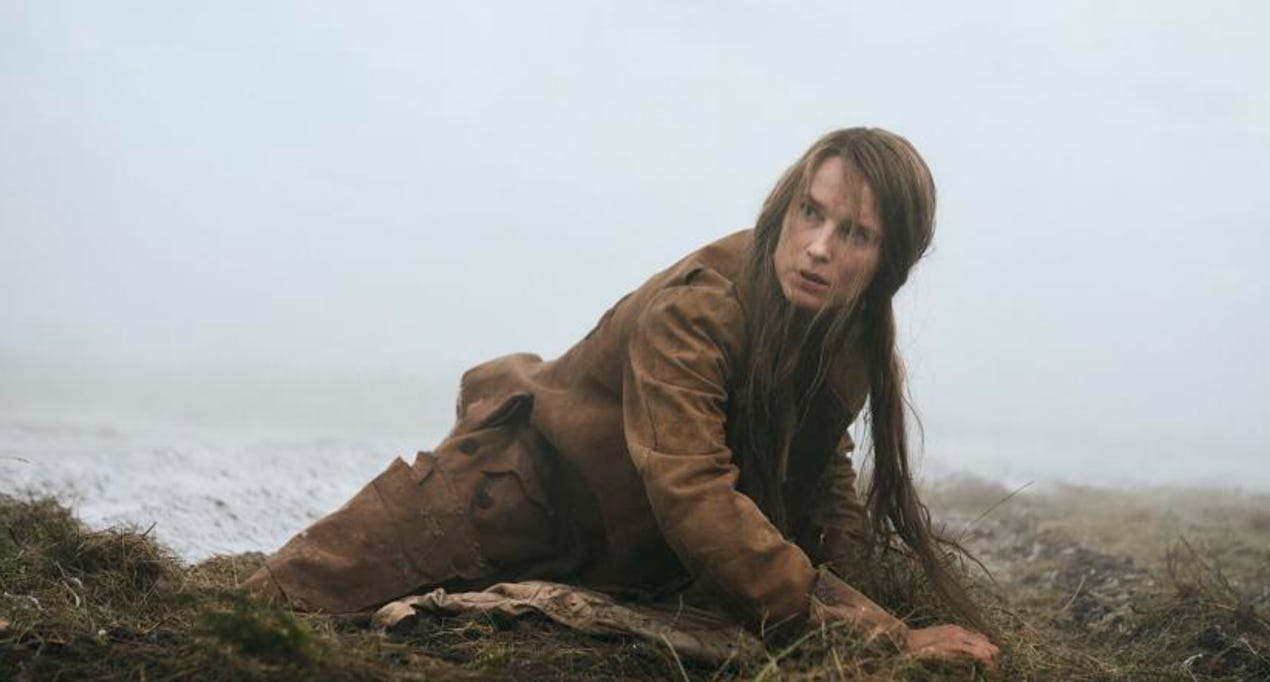"The Promised Land" is Your Thanksgiving Movie for 2024
This 2023 Danish film should speak strongly to Americans I know who've given up on films
A whole bunch of people I know have given up on the movies. And I get it: too many other great things for you to do, and most movies don’t seem inspired.
If that’s you, try this 2023 movie, “The Promised Land.” (As of now, you can get this film for free via Hoopla, which is connected to most American public-library systems. All you need is a library card.)
“The Promised Land,” actually titled in Danish as “The Bastard” (Basterden), brings back the sweeping historical epic with strong performances that gripped me and had me *not* checking my phone throughout — a rare feat these days.
Partly this is a great-man-settling-land movie, featuring the stone-faced Mads Mikkelsen, pictured above as his laborers burn the Danish heather from potential farmland.
Mikkelsen plays a late 18th-century captain, Ludvig Kahlen, who wants recognition and titles from the Danish king, including an estate with servants. To get that, he’ll have to do the impossible: settle and grow productive crops on the Danish heath.
This is a real wasteland of a place. Near the sea, the soil seems too barren to produce anything except the tangly heather that will give any farmer fits and nightmares.
It might, because it’s so unruly, even force them into starvation.
That means “The Promised Land” is a frontier and colonial narrative, but with a big twist. No one is being pushed off their land or subjected to an outside colonizer, save nasty bandits in the nearby woods and a sadistic aristocrat who wants no settlers to successfully farm nearby because they’ll undermine his local power.
Thereby, the movie avoids any criticism of being “colonialist” just via its time and place.
I have never thought about or cared about the old Danish heath, until now.
For Americans, this all codes as “Western,” but “The Promised Land” adds mightily to that well-known staple of tropes. Here the movie is both ancient, Old Testamental in scope, as the Americanized title suggests, and it features the odd ideological combo of pro-monarchist and pro-land-settlement positions at the movies.
Given that Americans, not exactly monarchists at heart, have long dominated movie culture, that a strange and welcome twist on tired old formulas.
This movie could’ve been made in the 1950s; just change the setting and value-system.
As expected in this fare, Captain Ludvig faces a thousand troubles. The young local aristocrat is movie-cruel, psychopathic enough to act on his philosophy that “God is chaos.” He beats and even kills servants to prove that point.
Those servants are, to viewers today, de facto slaves.
Yet Ludvig has to have laborers to accomplish his agricultural plans, so he uses two escaped servant-slaves whom the aristocrat wants back. Even that plan falls short, so he turns to the local anarchic bandits in the woods, who initially tried to rob and kill him.
One of them is a "darkie," a young girl who’s grown up with these bandits, a youngster that the bachelor-bastard Captain will have to provide for.
The movie highlights how cruel nature can be, yet how much crueler people are.
One question is whether the Captain himself, a type-A man’s type-A man, should be so demanding and orderly. His own cruelty might be necessary to settle the untamable land, yet he knows how wicked the aristocrat is. How should one have treated forced labor in a time like this?
In Crusoe-like fashion, the settler-farmer builds his local kingdom, with hardships galore. These hardships compound quickly. The movie proceeds more briskly than I anticipated it would, because it wants to highlight human conflicts much more so than environmental ones. And there are dozens of such human conflicts even in such a remote place.
The Promised Land seems like it ignores most 21st-century concerns that viewers have for an earthier, old-world perspective. Its fascinating English-language title hints at the movie’s Old-Testamental nature.
E.g., the protagonist is a kind of Abraham, albeit not really a God-worshipper. Although that's *the* key aspect of Abraham in Genesis, everything else is in place for the Abraham story.
That includes the a move of a foreign settler into rugged yet settled-already territory. He deals with local "pagans," makes raids, tries to grow his agricultural business, and he’s forced to handle ample moral quandaries, some of which are impossible.
You might not think 18th century Denmark would be so close in resemblance to the ancient Near East.But “The Promised Land” says it is: for man is made to settle and subdue frontiers, which is taming the thistly heather and the uncivilized types.
It also might turn out that the Captain, who longs for the King’s good graces, is more uncivilized than he would think he is.








